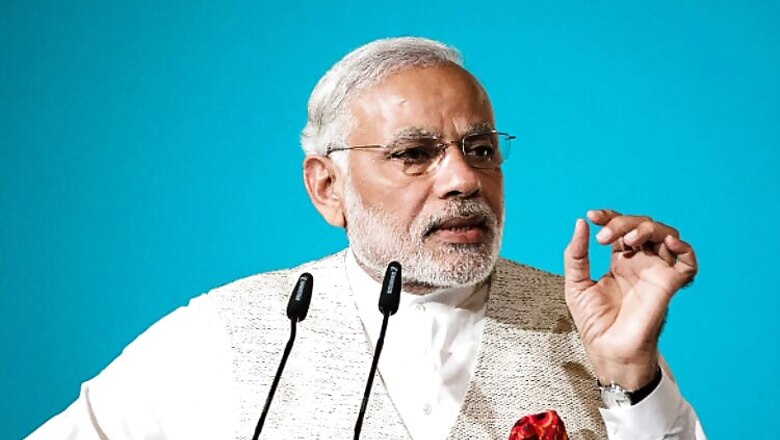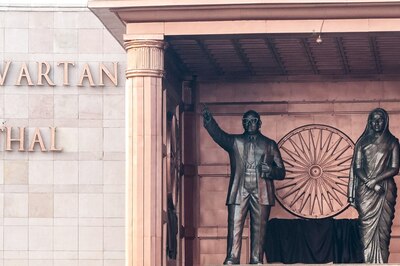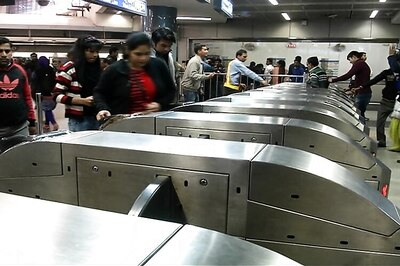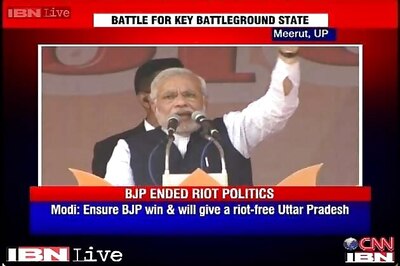
views
New Delhi: In a strong rebuttal to those doubting India being the fastest growing major economy, Prime Minister Narendra Modi on Monday reeled out statistics on credit growth and record FDI inflows to underscore that the economic success was the hard-won result of prudence, sound policy and effective management.
He said the government programmes are aimed at creating more employment as well as to carry out administrative and policy reforms for sustained growth.
"For India to be at the top of global growth tables is an unusual situation. Obviously, there are some who find that difficult to digest and come up with imaginative and fanciful ideas to belittle that achievement.
"The fact is that India's economic success is the hard-won result of prudence, sound policy and effective management," he said at the Bloomberg India Economic Forum.
Stating that India's growth rate is acknowledged as the highest among major economies, he said, "There are some who remain confused and have said the growth rate does not 'feel' right. Perhaps I can be of some assistance to them in reducing the confusion, by stating facts in place of feelings."
Reeling out statistics, he said there has been a smart pickup in credit growth after September. While credit off-take in the year to February increased by 11.5 per cent, overall fund flow to the corporate sector through equity and borrowings rose by over 30 per cent in the first three quarters of 2015-16.
Also, the trend of firms facing credit rating downgrade in 2013 and 2014 has been reversed and in the first half of fiscal year 2015-16, for every company getting a downgrade, there were more than two companies which received upgrades, the best level in recent years, he said.
"Net foreign direct investment in the third quarter of the current financial year was an all-time record," he said highlighting increased overseas funds in fertiliser, sugar and agricultural machinery, sectors closely connected with rural economy.
Also, FDI in construction saw 316 per cent growth, while the same in software and hardware almost quadrupled. "In a difficult global environment for exports, manufacturing output has fluctuated. However, several key sub-sectors of manufacturing are growing rapidly," he said.
Modi said his government's focus was on agriculture and doubling farm income by 2022. Also, his strategy is to optimise use of resources through efficient implementation.
"We have initiated many steps. Many more lie ahead. Some have begun bearing fruit. What we have achieved so far, gives me the confidence that with the support of people, we can transform India.
"I know it will be difficult. But I am sure it is doable. And I am confident, it will be done," Modi said.
Stating that experts are unanimous India is one of the world economy's brightest spots, he said the country has low inflation, a low balance of payments and current account deficit and a high rate of growth.
"This is the result of good policy, not good fortune," he said.
Underscoring good governance points, he said between 2008 and 2009 crude oil prices fell steeply from a peak of USD 147 per barrel to less than USD 50, a fall steeper than that seen between 2014 and 2015.
"Yet in 2009-10, India's fiscal deficit, current account deficit and inflation rate, all got substantially worse. And this slid was from a higher base figure for all three. But in 2015-16, all three have improved, from a lower base," he said.
He said, if oil prices were the driver of success, many emerging economies dependent on oil imports would have shown similar results. But they are not.
"We have not been lucky with global trade or growth. Both are low, and have not helped us in terms of export stimulus," he said, adding India has also had two successive years of drought which was compounded by unseasonal hailstorms.
Yet food grain production has remained much higher and inflation much lower, than in the last comparable drought year, which was 2009-10, he said.
On fiscal consolidation, he said ambitious fiscal targets have been met in each of the previous two years.
"We have reduced the deficit even while increasing capital expenditure. And the reduction has come despite an unprecedented steep cut in the Centre's share of tax revenues, in the award of the 14th Finance Commission," he said adding 2016-17 fiscal deficit target of 3.5 per cent of GDP is the second-lowest level in the last 40 years.
Topping the increase FDI inflows in fertiliser, sugar and agricultural machinery sectors, overseas fund flow in the automobile industry grew 71 per cent.
"This is concrete evidence that Make in India policy is having effect in employment intensive sectors," he said adding motor vehicle production, which is a strong indicator of consumer purchasing power and economic activity, has grown at 7.6 per cent.
The employment-intensive wearing apparel sector has grown at 8.7 per cent. Manufacturing of furniture has grown by 57 per cent, suggesting a pickup in sales of flats and houses, he said.
To boost agriculture, budgetary allocation for irrigation has been increased with the aim of 'per drop, more crop'. Also focus is on providing quality seeds and efficiency of nutrient use, Modi said.
Investments are being made in warehousing infrastructure and cold chain and value addition through food processing is being promoted. Also, a national agricultural market is being created to remove distortions.
"The introduction of FDI in marketing of domestic food products in this budget is with the same objective," he said and highlighted the crop insurance scheme.
"Through a combination of growth in production, more efficient input use, reduction in post-harvest losses, higher value addition, reduced marketing margins, risk mitigation and ancillary activities, I am confident we will achieve the targeted doubling of farmers' income," he said.
Prime Minister said more than reformed policies, India needs transformed execution.
The National Food Security Act, passed by the previous UPA government in 2013 but remained unimplemented in most states, is now being implemented nationwide. Similarly, leakages in the Mahatma Gandhi National Rural Employment Guarantee Scheme have been drastically reduced leakages to ensure that money reaches those for whom it is intended.
While coal, minerals and spectrum have been auctioned transparently raising large amounts, managerial improvements have resulted in elimination of the power shortage, a record high in highway construction per day and record port throughput.
"Many legacy issues have been solved. The number of stalled projects has declined," he said.
Modi said amendments to Reserve Bank of India Act will result in the central bank having an inflation target and setting interest rates through a Monetary Policy Committee.
"The committee will have no members from the government. Through this reform, monetary policy will acquire an inflation focus and a level of institutional autonomy unprecedented in major emerging markets, and greater than several developed countries.
"Together with our adherence to the path of fiscal consolidation, this is a testimony to our strong commitment to macro-economic prudence and stability," he said.
Modi said major policy reform in the petroleum sector through the new Hydrocarbon Exploration Licensing Policy provides for pricing and marketing freedom and a transparent revenue-sharing methodology.
"This will eliminate many layers of bureaucratic controls," he said adding marketing and pricing freedom has been given to on-going projects which have not been developed.
Also, Parliament has passed the Real Estate Regulation Act that would transform the real estate market, protecting buyers and promoting honest and healthy practices.
The UDAY scheme looks to address debt of electricity distribution companies of states, he said, adding India was targeting 175 gigawatts of renewable power by 2022, he said.
Stating that allowing FDI in hitherto closed sectors like railways and defence is already bearing fruits, Modi said two new locomotive factories involving an investment of over USD 500 billion are being built in Bihar, by GE and Alstom.
In insurance, Rs 9,600 crore of FDI in 12 companies from leading global insurers has already been approved.
For employment generation, Modi said the government has allowed 30 per cent weighted tax deduction on extra wage cost for three years to companies increasing their work force.
Also, the government has taken the responsibility for paying pension contributions for three years for all new persons enrolling in the Employee Provident Fund. This will apply to those with wages up to Rs 15,000 per month.
Prime Minister said with a view to empower higher educational institutions attain the highest standards, an enabling regulatory architecture will be provided to ten public and ten private institutions to make them world-class teaching and research institutions.
"Their regulatory framework will be separate from existing structures like the University Grants Commission and All India Council for Technical Education. They will have complete autonomy on academic, administrative and financial matters.
"We will provide additional resources for the next five years for the 10 public universities. This will eventually allow ordinary Indians affordable access to world-class degree courses. This initiative is the beginning of a journey to restore the original mandate of higher education regulators," he said.




















Comments
0 comment